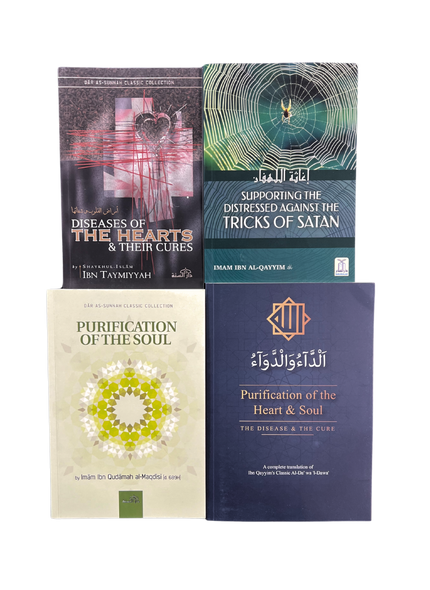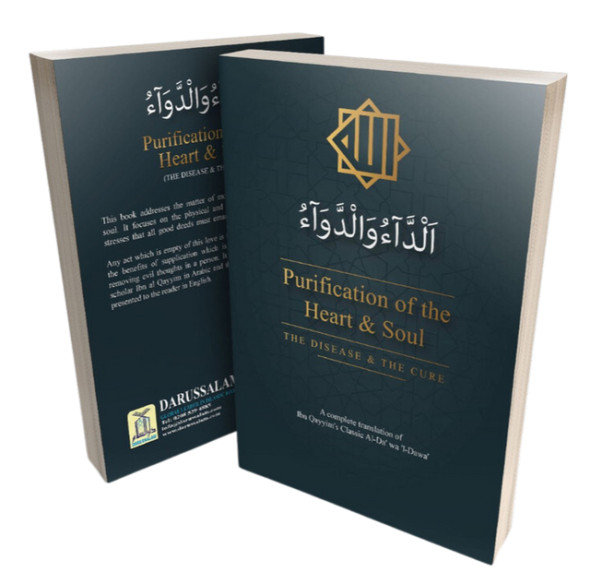Explanation Of The Three Fundamental Principles Of Islaam
This book is an explanation of Abdul-Wahhab's Thalaathatul Usool (The Three Principles). He wrote this in order to convey to every Muslim that which is obligatory upon him to know - in face the three principles are based on the three questions that we will all be asked in our graves. As such this book is beneficial for everyone Inshallah.
An Explanation of Muhammad ibn Abd al-Wahhabs Kitab Al-Tawhid
This book is a brief yet extremely beneficial explanation of Sheikh al-Islam Muhammad ibn Abd al-Wahhab?s famous Kitab al-Tawhid. The book, as the title suggests, deals with the subject of worshipping Allah alone without associating partners with Him. The author highlights many matters that have become common among Muslims even though they are clearly acts of shirk or associating partners with Allah. Not only is this book distinguished due to the importance of the subject matter but also due to the methodology adopted by the author for which he is well known. The reader will find that the majority of the book consists of verses of the Qur?an, ahadith of the Prophet (s) and sayings of the early Muslims. The explanation presented at the end of each chapter of Kitab al-Tawhid is that of the renowned scholar Allamah Abd al-Rahman al-Sa di, counted among the major scholars of recent times. He was born in al-Qasim, Saudi Arabia, in the year 1307AH, and from a young age became engrossed in the attainment of knowledge. His dedication and thirst for knowledge led him to become an authority in many of the Islamic sciences as is evident from the books that he authored. He passed away in the year 1376 AH, may Allah have mercy on him.
An Explanation of Muhammad ibn Abd al-Wahhab's Kash al-Shubuhat : A Critical Study of Shirk
This work, which is a detailed explanation of one of Muhammad ibn Abd al-Wahhab's most important works, deals with explaning and refuting the evidences that were used by certain Muslim groups of his time to justify acts of shirk (the act of associating partners with Allah). It is entitled Kash al-Shubuhat, which literally translates as: 'the clearing of doubts.' Ibn Abd al-Wahhab intended in this work to expose the falsity and speciousness of these arguments by proving that the pagans whom the Prophet (pbuh) fought utilized the exact same arguments and fell prey to the same reasoning as these modern practitioners of shirk did. It is one of the most advanced works on the subject, and over a dozen different arguments and evidences used to justify shirk are presented and then refuted. In order to maximize the benefit of this work, introductory sections concerning other aspects of shirk not mentioned by Ibn 'Abd al-Wahhab have been added by the author. To this end, the work discusses the definitions of shirk, the importance of knowing shirk, the difference between shirk and kufr, the types and categories of shirk, the history of shirk, the evils and futility of shirk, the causes of shirk, and other related topics. In addition, a brief biography of Muhammad ibn Abd al-Wahhab is included as a preface to the text of this book. This work is undoubtedly the most comprehensive study in the English language of shirk, and hence an essential book for thoes who wish to understand this great evil known to man.
An Explanation of Muhammad ibn Abd al-Wahhabs Four Principles of Shirk
In this book the author explains the dangerous concept of shirk through four simple principles. The sin of shirk ? or associating partners with Allah ? is the most reprehensible act that a person can do. It is for this reason that this sin is the one sin that Allah has promised He will never forgive. Unfortunately many Muslims who are unaware of the reality of shirk fall into it out of ignorance. This short treatise is an ideal work for the Muslim in order to understand the essence of shirk, and thus essential reading for the one who wishes to avoid falling into the greatest trap of shaytan. The explanation of the work of Muhammad ibn Abdul Wahhab has been taken from the works of Ibn Jibrin, Salih Al al-Sheikh, and other major scholars.

![[Bundle of 4 Books] Explanation of Classical Essentials [Bundle of 4 Books] Explanation of Classical Essentials](https://cdn11.bigcommerce.com/s-qrk4pkvixl/images/stencil/608x608/products/13245/21681/image_8__53108.1716912348.jpg?c=1)
![[Bundle of 4 Books] Explanation of Classical Essentials [Bundle of 4 Books] Explanation of Classical Essentials](https://cdn11.bigcommerce.com/s-qrk4pkvixl/images/stencil/608x608/products/13245/21677/three_fundamental_principle_1_1__58822_1__17857.1716912341.jpg?c=1)
![[Bundle of 4 Books] Explanation of Classical Essentials [Bundle of 4 Books] Explanation of Classical Essentials](https://cdn11.bigcommerce.com/s-qrk4pkvixl/images/stencil/608x608/products/13245/21678/a_critical_study_of_shirk_01__87288__80723.1716912341.jpg?c=1)
![[Bundle of 4 Books] Explanation of Classical Essentials [Bundle of 4 Books] Explanation of Classical Essentials](https://cdn11.bigcommerce.com/s-qrk4pkvixl/images/stencil/608x608/products/13245/21679/kitab_at_tawhid_01_1__89076__36004.1716912341.jpg?c=1)
![[Bundle of 4 Books] Explanation of Classical Essentials [Bundle of 4 Books] Explanation of Classical Essentials](https://cdn11.bigcommerce.com/s-qrk4pkvixl/images/stencil/608x608/products/13245/21680/four_principles_of_shirk_01__57001__60404.1716912341.jpg?c=1)
![[Bundle of 4 Books] Explanation of Classical Essentials [Bundle of 4 Books] Explanation of Classical Essentials](https://cdn11.bigcommerce.com/s-qrk4pkvixl/images/stencil/80x80/products/13245/21681/image_8__53108.1716912348.jpg?c=1)
![[Bundle of 4 Books] Explanation of Classical Essentials [Bundle of 4 Books] Explanation of Classical Essentials](https://cdn11.bigcommerce.com/s-qrk4pkvixl/images/stencil/80x80/products/13245/21677/three_fundamental_principle_1_1__58822_1__17857.1716912341.jpg?c=1)
![[Bundle of 4 Books] Explanation of Classical Essentials [Bundle of 4 Books] Explanation of Classical Essentials](https://cdn11.bigcommerce.com/s-qrk4pkvixl/images/stencil/80x80/products/13245/21678/a_critical_study_of_shirk_01__87288__80723.1716912341.jpg?c=1)
![[Bundle of 4 Books] Explanation of Classical Essentials [Bundle of 4 Books] Explanation of Classical Essentials](https://cdn11.bigcommerce.com/s-qrk4pkvixl/images/stencil/80x80/products/13245/21679/kitab_at_tawhid_01_1__89076__36004.1716912341.jpg?c=1)
![[Bundle of 4 Books] Explanation of Classical Essentials [Bundle of 4 Books] Explanation of Classical Essentials](https://cdn11.bigcommerce.com/s-qrk4pkvixl/images/stencil/80x80/products/13245/21680/four_principles_of_shirk_01__57001__60404.1716912341.jpg?c=1)






![[Bundle of 4 Books] History of islam Series [Bundle of 4 Books] History of islam Series](https://cdn11.bigcommerce.com/s-qrk4pkvixl/images/stencil/590x590/products/13242/21673/image_9__02001.1716910584.jpg?c=1)
![[Bundle of 4 Books] History of islam Series [Bundle of 4 Books] History of islam Series](https://cdn11.bigcommerce.com/s-qrk4pkvixl/images/stencil/590x590/products/13242/21669/history_of_islam_uthman_01__55414__42923.1716910118.jpg?c=1)

